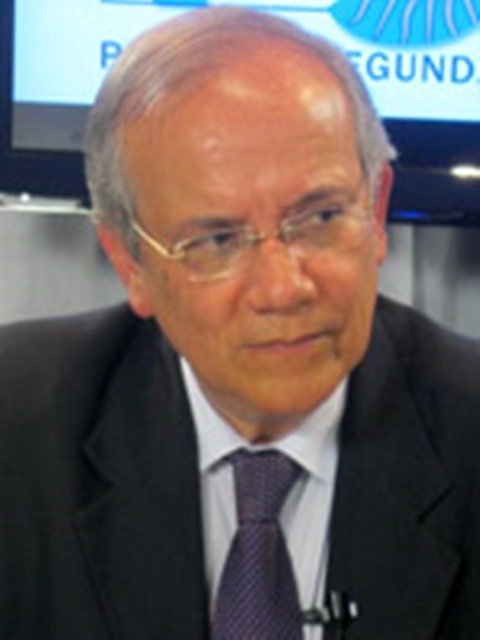'Democracia K': What’s going on in Argentina!?
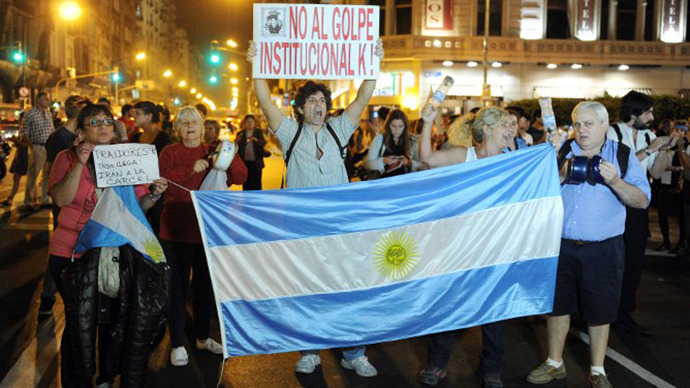
May 25th marks the tenth anniversary of Néstor Kirchner being inaugurated President of Argentina. At the time, few Argentines would have imagined what was in store for their country with the advent of the “K” – for Kirchner – Regime.
Especially after his hand-picked successor Cristina Kirchner became president in 2007, later re-elected in 2011. A year and a half into Cristina’s second term, Argentina is once again roller-coasting increasingly out-of-control into what may yet become another national catastrophe, marked by spiralling inflation, a panic-driven foreign exchange clamp-down, economic slump, increasing street violence, ferocious taxation of workers’ falling salaries and – worst of all – rampant, unprecedented corruption at the highest levels of government.
It’s the economy, stupid...!
After her re-election, Mrs Kirchner thought she could easily
stay in power by continuing to subsidize the poor, divide the
opposition and pick fights with traditional sectors like the
Catholic Church, the armed and security forces, farmers, the
opposition media, and periodically whip-up “nationalist fervour”
with suitably staged measures.
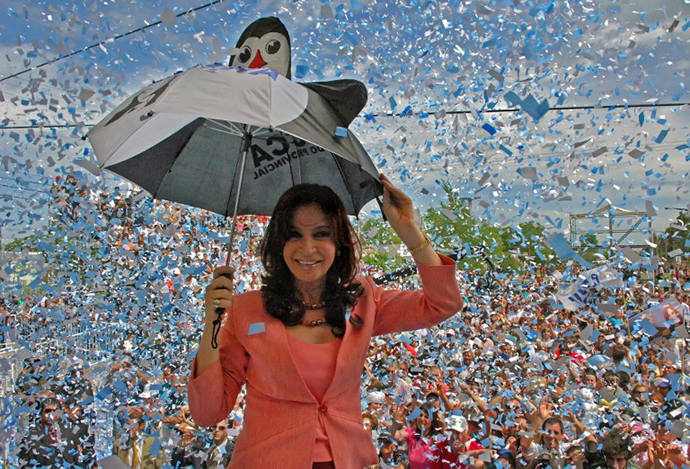
Demanding the UK return the Falkland/Malvinas Islands to Argentina, for example, even though her government has all but disarmed the country’s armed forces. Or permanently harping over the “desaparecidos” – the militants who disappeared under the military regime of the ‘70’s - but never investigating Argentina’s now almost $137 billion foreign debt whose roots date back to that military juntas’ economic policies. Or nationalizing Spanish oil company Repsol’s majority shareholding in Argentina’s YPF, which Néstor and Cristina Kirchner helped privatize 21 years ago. Or attacking the opposition media by promoting “democratization of the press”, with government taking over key media conglomerates putting them in the hands of pro-Kirchner frontmen and targeting “Clarin”, the country’s largest group. More recently, by “democratizing” the Judiciary: a euphemism for bringing it under the full control of the executive branch.
Most of this has been high profile government propaganda often serving as smoke screens to hide deeper economic trouble brewing in the dark, involving three key factors that are now all but out of control: inflation, the rapidly depreciating Argentine Peso and gross corruption at the highest levels of government that has all but halted local and foreign investment and trust.
Inflation & Devaluation
First and foremost, then, inflation, which for two years has been eroding workers’ salaries at a time when government deficit spending translates as ferocious, record level tax pressure on all workers.
Private consultancies put annual inflation at 30 to 35 per cent, but the official government figure put out by the INDEC government statistics office under the grip of powerful commerce secretary and Kirchner insider Guillermo Moreno, says it is “just 10.8%”. This is so laughable that even INDEC’s employees publicly denounce such blatantly falsified data.
When a Greek journalist recently asked Economy Minister Hernán Lorenzino a simple question - “What is Argentina’s inflation?” - a visibly terrified Lorenzino looked at the camera, asked for the interview to stop and was then heard twice pleading, “I want to leave…! I want to leave!!.
He knows only too well that telling the truth about inflation will get him into huge trouble with Mrs Kirchner, Mr Moreno and the militant Marxist organization “La Campora” led by presidential son Maximo, which today runs much the economy as well as key state companies such as YPF, flag carrier Aerolíneas Argentinas which losses around 3 million dollars a day, the Central Bank, and the ANSES Public Pensions Fund.
Last year, the government went into panic-mode imposing an all but full exchange clamp-down, especially in US Dollar trading, for decades a key financial indicator. During its first eight years in power, the Kirchner government artificially kept it stable at around 3 pesos per dollar. However huge government deficits and payment of Argentina’s foreign debt forced the government to do everything necessary to get its hands on every dollar in town. Result: no dollars for anybody; whether for travelling abroad, or imports, or the real estate market which traditionally uses the dollar to offset endemically high local inflation, or for foreign companies to pay dividends abroad.
The official rate has now peaked to over 5.35 pesos whilst the black market rate – which did not even exist until around a year ago – pierced the 10 peso mark a few weeks ago.
Government Corruption
But what has become a prime source of national concern is massive government corruption in which money stolen by Kirchnerites runs anywhere from one to many billions of Dollars, or rather Euros, since we have now discovered Mr Kirchner´s fetishist obsession with 500 Euro bank notes.
Kirchner’s own former deputy-governor of Santa Cruz Province, Eduardo Arnold, went public describing how he relished touching large bundles of cash, filling his pockets, safes and vaults with it. A private video from several years back just surfaced showing Mr K joking with a group of cronies whilst caressing a large safe exclaiming “this is ecstasy to me!”.
Sadly, the “K Corruption List” is very long:
- In 1993 as governor of Santa Cruz Province he expatriated 654
million dollars in public funds into tax havens of which only small
amounts trickled back; when a local lawsuit was filed on this case
he maneuvered the case and ended up being acquitted by judge
Santiago Lozada who is his nephew-in-law;
- Widespread public works bribery in the Infrastructure Ministry
run by crony Julio De Vido; when former economy minister and
whistle-blower Roberto Lavagna publicly disclosed this in 2005, Mr.
K promptly fired him;
- Embezzlement of government railway subsidies under crony
transport ministers Ricardo Jaime and Juan Pablo Schiavi; both are
under investigation over a railway accident that killed 51
passengers in February 2012 in Buenos Aires’ derelict, run-down and
unmaintained passenger trains;
- Cristina Kirchner’s 2007 presidential campaign funding where a
Venezuelan crony was caught trying to bring into the country a
suitcase stashed with 800.000 dollars cash “for Cristina’s
campaign”, as well as campaign contributions from illegal drug
front-companies;
- Public funding for the “Madres Plaza de Mayo” NGO - a front for
70’s terrorists’ rights – embezzled by its head Sergio Schoklender
(who spent decades in jail for murdering his parents in 1981),
whose treasurer is Felisa Miceli, a former K economy minister
forced to resign in 2005 after bundles of hard cash were found in
her ministry toilette.
The list goes on and on…
In all these cases friendly “K” judges are systematically appointed to hear in these cases which are then suitably diverted, mismanaged, delayed, hushed up and closed.
Mass sacndal
In recent weeks, Jorge Lanata, a well-known left-wing investigation journalist acting as spokesman for the “Clarin” multimedia group, began showing very concrete and convincing evidence on his prime-time Sunday evening TV program. K-frontmen were shown collecting so much cash for their bosses that they would not even bother to count it but rather weighed huge bags containing 500 Euro notes which were then whisked off on private jets to tax havens in Panama and Belize, and to the K’s home province of Santa Cruz.
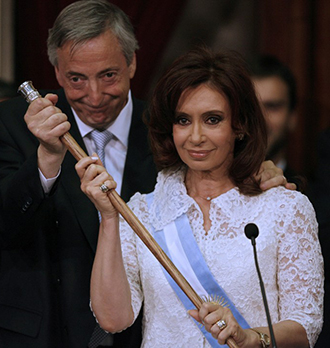
Strong rumours have it that the K’s had a bank-size vault built into their private residence to store billions. Some even believe that Néstor Kirchner’s mausoleum (he died in rather unclear and disturbing circumstances in October 2010) might be “full of money and empty of a corpse”.
The truth is that all close “K” cronies have become filthy rich over the past decade:
- Vice President Amado Boudou used frontmen to buy Ciccone, a major bank note
currency printer, securing multi-million dollar Argentine
Central Bank contracts.
- Rudy Ulloa Igor, K’s chauffeur grew from low-class taxi-driver to
multimillionaire media mogul in Santa Cruz;
- Ricardo Barreiro; K´s house gardener now owns a splendid mansion and a 4-Star hotel in
his native Tucuman Province;
- Key K associate Lázaro Báez grew from being a simple bank clerk at the
Banco de Santa Cruz to owning the three top construction companies in the
province, dozens of estancias, and even his accountant
purchased a 14 million dollar farm in Uruguay.
Again, the list goes on and on and on…
Argentina: a Money-laundering Haven
Inflation + Devaluation + Corruption = an explosive formula indeed...
The K Economic Team’s wondrous solution to all this? 10 days ago Cristina Kirchner declared a full “don’t ask / don’t tell” illegal funds jubilee to try to get Argentines with foreign deposits (estimated at 180 to 220 billion) to repatriate them by paying no taxes, without having to justify where the money came from. Music to local and international money-launderers!!!
Especially with all the local front-men ready to lease their names and shell companies to drug cartels and arms dealer willing to pay a nice “commission”.
All of this at a time when Argentina’s hard working middle class is under ferocious pressure from AFIP – the government tax office – that milks workers at record high tax collection rates. The message is clear:
- If you’re an honest worker, you’re in real
trouble;
-
If you’re a money-launder,
the government easily gets you off the hook.
In practical terms, Argentina has now become an international tax haven, something which some rather nasty people in Mexico, Colombia and elsewhere must be eagerly watching.
Cristina Kirchner herself is also in dire straits trying to
explain how she managed to grow her officially declared assets
tenfold to 70.000.000 pesos by 2011, then equivalent to around 20
million dollars.
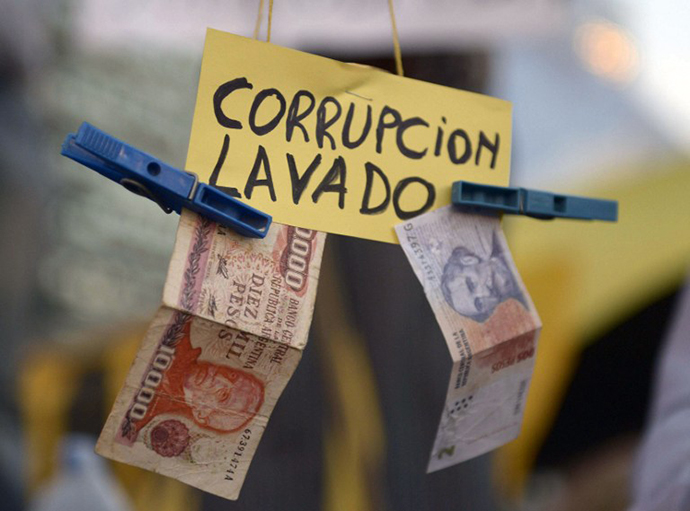
When she visited Harvard University last year, a young student raised her hand to ask exactly that question, to which a visibly uneasy Mrs K replied that she was “a very successful lawyer”. Pity that there isn’t single court in Argentina’s judicial system having record of any legal lawsuit where Cristina Lawyer may have been awarded fees remotely anywhere near those amounts.
The scandal grows by the hour.
Again, K’s former deputy-governor Eduardo Arnold went public saying he too believed there were money-filled vaults in the K home and mausoleum hiding tons of Euros. Néstor K’s former private secretary (kicked out by Mrs K) publicly declared she had heard and seen key K “helpers and assistants” carrying and talking about bags stuffed with kilos of Euros. K´s architect who built his residence actually showed the house plans and exact location of the vault on national TV. Knowing of K’s preference for 500 Euro bank notes, that vault could have housed up to 3 billion Euros…
Meanwhile, K shock-troop urban groups like “La Campora” and “Vatatyon Militante” are manned by throngs of lumpen thugs thrown onto the streets at a moment’s notice to barricade, picket and harass their way across the country, shutting down highways, taking over public parks and squares. and terrorizing the population at large – the middle class in particular. Rumours abound of their weapons arsenals. This is their way of fighting for Cristina K’s “Model” of government.
This has brought millions of opponents out on the streets, especially the vast and still unorganized working middle class which is getting increasingly fed up with the K-Regime. Mass middle-class anti-government demonstrations took to the streets on September 13th and November 8th last year and, more recently, on 18th April.
With legislative elections set for October and the situation growing worse say by day, this promises to be a very complicated year for Argentina.
The statements, views and opinions expressed in this column are solely those of the author and do not necessarily represent those of RT.
The statements, views and opinions expressed in this column are solely those of the author and do not necessarily represent those of RT.
